Logesh Kumar Umapathi
Med-HALT: Medical Domain Hallucination Test for Large Language Models
Jul 28, 2023



Abstract:This research paper focuses on the challenges posed by hallucinations in large language models (LLMs), particularly in the context of the medical domain. Hallucination, wherein these models generate plausible yet unverified or incorrect information, can have serious consequences in healthcare applications. We propose a new benchmark and dataset, Med-HALT (Medical Domain Hallucination Test), designed specifically to evaluate and reduce hallucinations. Med-HALT provides a diverse multinational dataset derived from medical examinations across various countries and includes multiple innovative testing modalities. Med-HALT includes two categories of tests reasoning and memory-based hallucination tests, designed to assess LLMs's problem-solving and information retrieval abilities. Our study evaluated leading LLMs, including Text Davinci, GPT-3.5, LlaMa-2, MPT, and Falcon, revealing significant differences in their performance. The paper provides detailed insights into the dataset, promoting transparency and reproducibility. Through this work, we aim to contribute to the development of safer and more reliable language models in healthcare. Our benchmark can be found at medhalt.github.io
StarCoder: may the source be with you!
May 09, 2023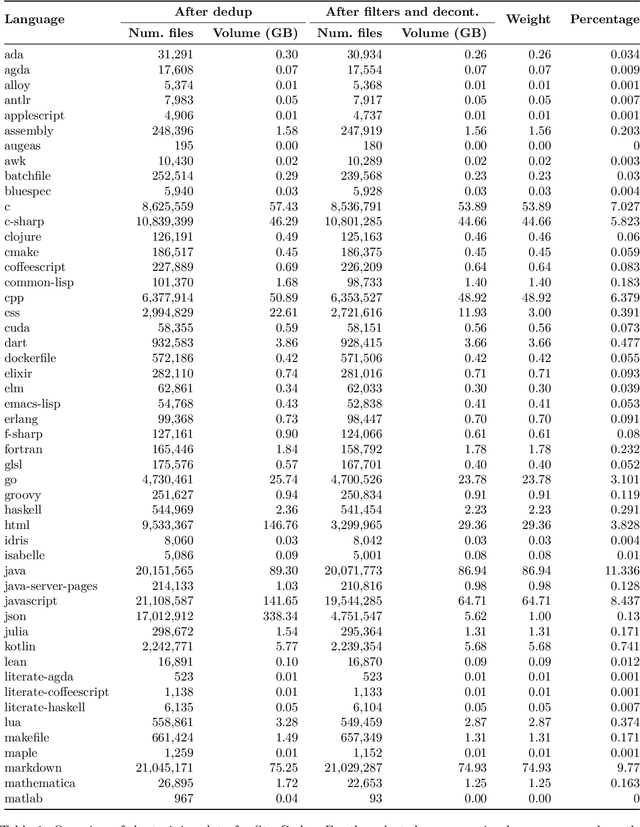
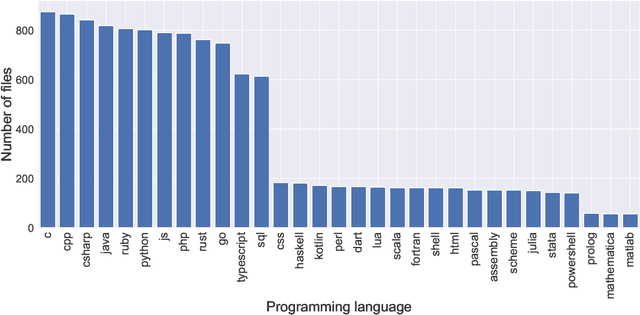
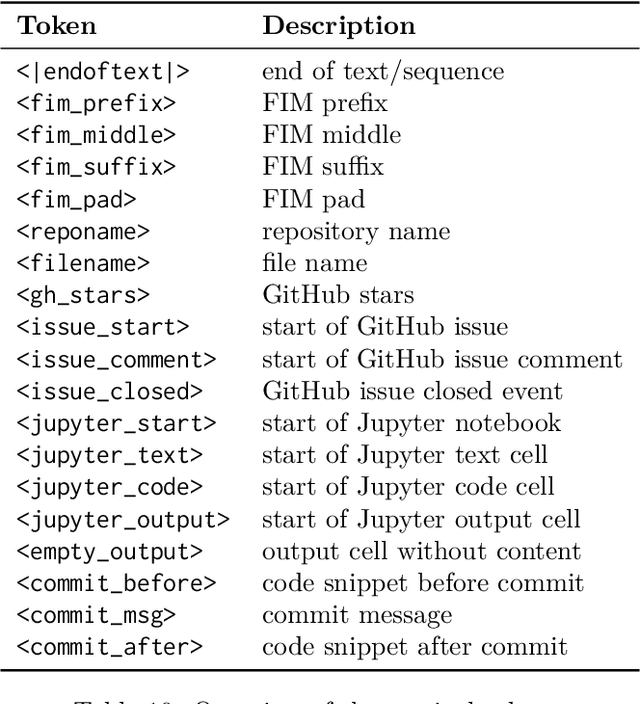
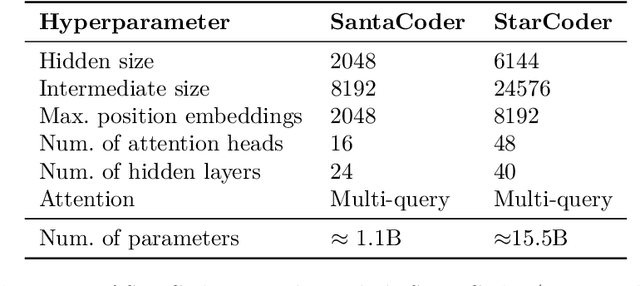
Abstract:The BigCode community, an open-scientific collaboration working on the responsible development of Large Language Models for Code (Code LLMs), introduces StarCoder and StarCoderBase: 15.5B parameter models with 8K context length, infilling capabilities and fast large-batch inference enabled by multi-query attention. StarCoderBase is trained on 1 trillion tokens sourced from The Stack, a large collection of permissively licensed GitHub repositories with inspection tools and an opt-out process. We fine-tuned StarCoderBase on 35B Python tokens, resulting in the creation of StarCoder. We perform the most comprehensive evaluation of Code LLMs to date and show that StarCoderBase outperforms every open Code LLM that supports multiple programming languages and matches or outperforms the OpenAI code-cushman-001 model. Furthermore, StarCoder outperforms every model that is fine-tuned on Python, can be prompted to achieve 40\% pass@1 on HumanEval, and still retains its performance on other programming languages. We take several important steps towards a safe open-access model release, including an improved PII redaction pipeline and a novel attribution tracing tool, and make the StarCoder models publicly available under a more commercially viable version of the Open Responsible AI Model license.
SantaCoder: don't reach for the stars!
Jan 09, 2023



Abstract:The BigCode project is an open-scientific collaboration working on the responsible development of large language models for code. This tech report describes the progress of the collaboration until December 2022, outlining the current state of the Personally Identifiable Information (PII) redaction pipeline, the experiments conducted to de-risk the model architecture, and the experiments investigating better preprocessing methods for the training data. We train 1.1B parameter models on the Java, JavaScript, and Python subsets of The Stack and evaluate them on the MultiPL-E text-to-code benchmark. We find that more aggressive filtering of near-duplicates can further boost performance and, surprisingly, that selecting files from repositories with 5+ GitHub stars deteriorates performance significantly. Our best model outperforms previous open-source multilingual code generation models (InCoder-6.7B and CodeGen-Multi-2.7B) in both left-to-right generation and infilling on the Java, JavaScript, and Python portions of MultiPL-E, despite being a substantially smaller model. All models are released under an OpenRAIL license at https://hf.co/bigcode.
MedMCQA : A Large-scale Multi-Subject Multi-Choice Dataset for Medical domain Question Answering
Mar 27, 2022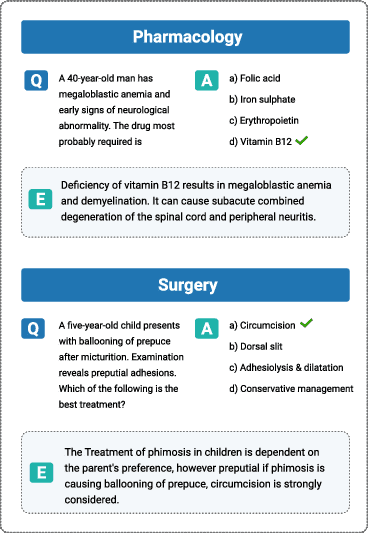

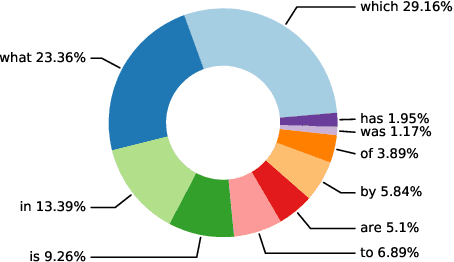
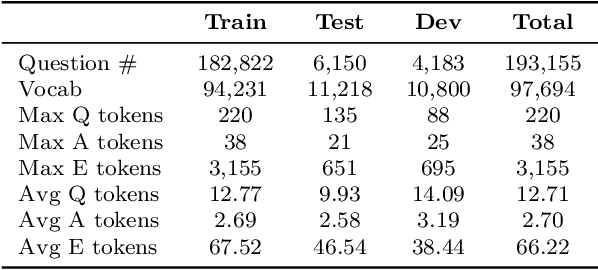
Abstract:This paper introduces MedMCQA, a new large-scale, Multiple-Choice Question Answering (MCQA) dataset designed to address real-world medical entrance exam questions. More than 194k high-quality AIIMS \& NEET PG entrance exam MCQs covering 2.4k healthcare topics and 21 medical subjects are collected with an average token length of 12.77 and high topical diversity. Each sample contains a question, correct answer(s), and other options which requires a deeper language understanding as it tests the 10+ reasoning abilities of a model across a wide range of medical subjects \& topics. A detailed explanation of the solution, along with the above information, is provided in this study.
* Proceedings of Machine Learning Research (PMLR), ACM Conference on Health, Inference, and Learning (CHIL) 2022
 Add to Chrome
Add to Chrome Add to Firefox
Add to Firefox Add to Edge
Add to Edge